Taj Mahal is a Shiv Temple named 'Tejo Mahalya'.
Yes it is True. We all Know that History has always been Altered by the Aristocrats and Tyrants. And the same thing has happened with
Hindus by the Invading Moghuls. They Had destroyed, killed, and massacred many
Hindus and evidences of their Existence. And one of the Biggest Alteration they
did to History was the Wrong Story of Taj Mahal being built by Shah Jahan.
Here’s the Whole Research and Proofs Stating that Taj Mahal was Actually Tejo Mahalya, a Shiv Temple:
No one has ever challenged it except Prof. P. N. Oak, who
believes the whole world has been duped. In his book Taj
Mahal: The True Story, Oak says the Taj Mahal is not Queen Mumtaz's
tomb but an ancient Hindu temple palace of Lord
Shiva (then known as Tejo Mahalaya).
In the course of his research Oak discovered that the Shiva
temple palace was usurped by Shah Jahan from then Maharaja of Jaipur, Jai Singh. In his own court chronicle,
Badshahnama, Shah Jahan ADMITS that
an exceptionally beautiful grand mansion
in Agra was taken from Jai SIngh for Mumtaz's burial . The ex-Maharaja of Jaipur still retains in his secret collection two
orders from Shah Jahan for surrendering the Taj building. Using captured
temples and mansions, as a burial place for dead courtiers and royalty was a
common practice among Muslim rulers.
For example, Humayun,Akbar, Etmud-ud-Daula and Safdarjung
are ALL buried in such mansions.
Proofs, Historical and Religious Recordings
1.
Oak's inquiries began with the name of Taj Mahal. He says
the term "Mahal" has NEVER
BEEN USED for a building in any Muslim countries from Afghanisthan to
Algeria.
"The unusual explanation that the term Taj Mahal derives from Mumtaz Mahal was illogical in at least two respects:
Firstly, her name
was NEVER Mumtaz
Mahal but Mumtaz-ul-Zamani,"
he writes. .
Secondly, one CANNOT OMIT THE FIRST THREE letters
'Mum' from a woman's name to derive the remainder as the name for the
building."Taj Mahal, he claims, is a CORRUPT
VERSION of Tejo Mahalaya, or Lord Shiva's Palace.
Oak also says the love story of Mumtaz and Shah Jahan is a FAIRY TALE created by court sycophants,
blundering historians and sloppy archaeologists . Not a single royal chronicle
of Shah Jahan's time corroborates the love story…!
2.
Furthermore, Oak cites several documents suggesting the Taj
Mahal PREDATES Shah Jahan's era, and
was a temple dedicated to Shiva, worshipped by Rajputs of Agra city. For
example, Prof. Marvin Miller of New York took a few samples from the riverside
doorway of the Taj. Carbon dating tests revealed that the door was 300 years older than Shah Jahan….!
Now think this…: If the Tejo Mahalya PREDATES 300 YEARS before Shah Jahan’s Birth, then how the Bloody Hell he Had Built
it…!!
Furthermore, Since
the doors of the Tejo Mahalya were broken open by Muslim invaders repeatedly
from the 11th century onwards, for plunder and ravage, had to be replaced from
time to time. Thus, the Tejo Mahalya is much older than many of its doors.
Infact, a report published by Evan
Williams, Professor of Chemistry, and Brooklyn College, New York, says that a wood piece from the door at North
East end of the Taj Mahal has an age between 1448 to 1270 A.D…!
Adding to this, European traveler Johan Albert Mandelslo, who
visited Agra in 1638 (only seven years after Mumtaz's death), describes the
life of the city in his memoirs. But he makes NO REFERENCE to the Taj Mahal being built by Shah Jahan for Mumtaz’s
Burial.
The writings of Peter Mundy, an English visitor to Agra
within a year of Mumtaz's death, also suggest the Taj was a noteworthy building
WELL BEFORE SHAH JAHAN'S TIME.
3.
Architectural Evidence
Well –known Western authorities on architecture like E. B. Havell, Mrs Kenoyer and Sir W. W. Hunter have gone on record to say that the Taj Mahal is BUILT IN THE HINDU TEMPLE STYLE. Havell points out that the ground plan of The Ancient Hindu Chandi Shiva Temple in Java is identical with that of the Taj.
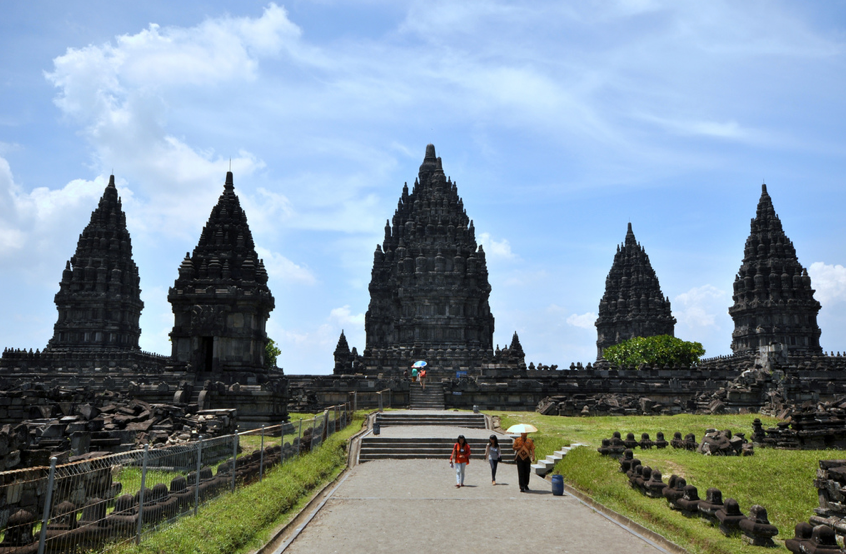 |
| Lara Jonggrang Temple or Chandi Shiva Temple |
 |
| Deities in Towers of Chandi Shiva Temple |
- A central dome with octagonal cupolas at its four corners is a common feature of Hindu temples. The four marble pillars at the plinth corners are of the Hindu style. They were used as lamp–towers during the night and as watchtowers during the day. Such towers serve to demarcate the holy precincts. Hindu wedding altars and the altar set up for God Satyanarayan worship has pillars raised at their Four Corners. Even our marriage mandaps are so.
| Hindu Marriage Mandap |
- The octagonal shape of the Taj Mahal has a special Hindu significance because: Hindus alone have special names for the eight directions, and celestial guards assigned to them. Lord Rama’s capital was octagonal as mentioned in Valmiki’s Ramayana. The pinnacle points to the heaven while the foundation signifies the below world. Hindu forts, cities, palaces and temples generally have an octagonal layout or some octagonal features so that together with the pinnacle and the foundation they cover all ten directions in which the king or god holds sway, as per Hindu tradition.
 | ||
| Octagonal Krishna Temple, Durbar Square,Kathmandu, NEPAL. |
- Encyclopedia Britannica is wrong in terming the four marble towers around the Taj Mahal as minarets. Muslim minarets are always part of the building. These ones DETACHED from the building, are Hindu towers. Muslim minarets start from the shoulders of the buildings. Hindu towers start from the floor level like the Rana Kumbha tower at Chittogarh. Also Muslim pairs of minarets are of varying heights and never symmetrical.
 |
| Masjid in Medina Showing Minarets attached to the Main Buillding. |
 |
| Rana Kumbha tower at Chittogarh detached from Temple |
- The Taj Mahal has a TRIDENT PINNACLE over the dome. A
full-scale figure of that trident pinnacle is inlaid in the red-stone courtyard
to the east of the Taj. The central shaft of the trident depicts a Kalash
(sacred pot) holding two bent mango leaves and a coconut. This is a sacred Hindu motif. Identical
pinnacles may be seen over Hindu and Buddhist temples in the Himalayan region.
Tridents are also depicted against a red lotus background at the apex of the
stately marble arched entrances on all four sides of the Taj Mahal.
People fondly but mistakenly believed all these three centuries that the Taj pinnacle depicts an Islamic crescent and star or was a lighting-conductor installed by the British rulers of India.
Contrarily the pinnacle made of a non-rusting 5-metal alloy, is also perhaps a Vedic lightning deflector. That the replica of the pinnacle is drawn in the eastern courtyard is also significant because the east is of special importance to the Hindus, as the direction in which the sun rises.
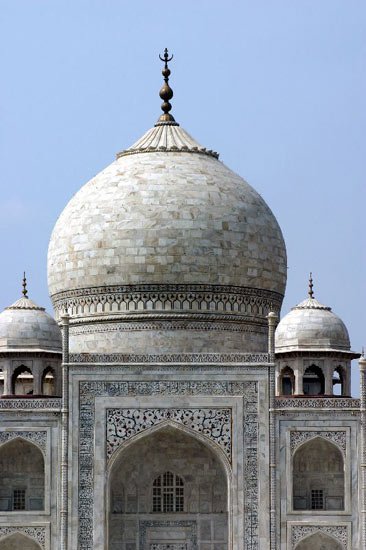 |
| Taj Mahal pinnacle is a trident not a crescent star |
 |
| Taj Mahal pinnacle closeup with kailash pot |
 |
| A Typical Kalash Pot with Coconut |
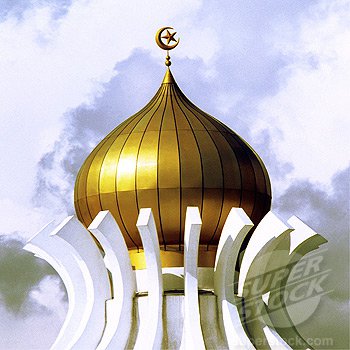 |
| Symbol of Muslim Architecture on a New Malaysian Mosque |
Adding to this, do you know that The
pinnacle on the dome has the word Allah Forged on it by the first British
archaeological chief Alexander Cunningham, as is apparent from some British
names emblazoned on it with a flame-thrower stove by those sent up the dome for
the forgery. The pinnacle figure in the eastern red-stone courtyard does not have the word Allah.
4.
Inconsistencies
- The two buildings which face the marble Taj from the East and
West are identical in design, size and shape and yet the eastern building is
explained away by Islamic tradition, as a community hall while the western
building is claimed to be a mosque. How could buildings meant for radically
different purposes be identical? This proves that the western building was put
to use as a mosque after seizure of the Taj property by Shahjahan. Curiously
enough the building being explained away as a mosque has no minaret. Those two
identical flanking buildings are a pair of reception pavilions of the Tejo Mahalaya
temple-place complex.
- A few yards away on both flanks are two Nakkar Khanas alias drum houses which is an intolerable incongruity for Islam. The proximity of the drum house indicates that the western annex was not originally a mosque. Contrarily a Drum House Is A Necessity in a Hindu temple or palace because Hindu chores morning and evening begin to the sweet strains of music. Music Is Against Islam.
- The sanctum in the Taj Mahal had silver doors and gold railings as Hindu temples still have. It also had nets of pearl, and gems stuffed in the marble lattices. It was the lure of this wealth, which made Shahjahan commandeer the Taj Mahal from a helpless vassal Jaisingh, the then ruler of Jaipur.
- Above Mumtaz’s cenotaph hangs a chain by which now hangs a lamp. Before capture by Shahjahan the chain used to hold a gold water pitcher from which water used to drip on the Shiva Linga. It is this earlier drip-drop Hindu tradition in the Taj Mahal which gave rise to the Islamic myth of Shah Jahan’s love tear dropping on Mumtaz’s tomb on a full moon day on winter-eve.
 |
| Water Pitcher over shivling in Somnath |
5.
Even the hammer-story is a
fabrication.
Firstly, nobody seems to ask why should any mason bear any grudge towards Shahjahan when the latter is said to have spent liberally and lavishly in commissioning the mausoleum?
Secondly, even if a mason bore any grudge he would not be permitted access to the emperor to exchange hot words with. Even if there were any argument between the two it would not be between a Shahjahan standing in the garden and the petulant mason on the supper perch like an irate monkey on top of the dome at a perpendicular height of 243 feet or so...! What is more, even an angry mason’s powerful hammer stroke would not make even the slightest dent in the dome because the dome has a 13-feet thick wall covered with hard marble.
Firstly, nobody seems to ask why should any mason bear any grudge towards Shahjahan when the latter is said to have spent liberally and lavishly in commissioning the mausoleum?
Secondly, even if a mason bore any grudge he would not be permitted access to the emperor to exchange hot words with. Even if there were any argument between the two it would not be between a Shahjahan standing in the garden and the petulant mason on the supper perch like an irate monkey on top of the dome at a perpendicular height of 243 feet or so...! What is more, even an angry mason’s powerful hammer stroke would not make even the slightest dent in the dome because the dome has a 13-feet thick wall covered with hard marble.
The hammer-stroke and tear drop
stories are a fraudulent Islamic fabrication based on two facts. One of those
we have already noted namely that in the Hindu tradition water did drip in
droplets from a pitcher hung over the Shiva Linga. The second fact is that
Shahjahan was so stingy by nature that he did not want to spend even a pie from
his own treasury in transforming a captured Taj Mahal into an Islamic
mausoleum.
His troops used to round up workers from Agra City and the
neighborhood at sword point or at the crack of a whip. Such forced labor was
employed for years in pulling out Hindu idols, grafting Koranic engravings, and
sealing five of the seven stories of the Taj Mahal. Being compelled to work for
years without wages, the workmen rebelled. A haughty Shahjahan punished them by
amputating their hands.
6.
Treasury Well
Between the so-called mosque and the drum house is a
multi-storeyed octagonal well with a flight of stairs reaching down to the
water level. This is the traditional treasury well in Hindu temple-places.
Treasure chests used to be kept in the lower apartments while treasury
personnel had their offices in the upper chambers. The circular stairs made it
difficult for intruders to reach down to the treasure or to escape with it
undetected or unparsed. In case the premises had to be surrendered to a
besieging enemy the treasure could be pushed into the well to remain hidden
from the conqueror and remain safe for salvaging if the place was reconquered.
Such an elaborate multi-storeyed well is superfluous for a mere mausoleum. Such
a grand, gigantic well is unnecessary for a dead Mumtaz when even a living
Muslim does not use so much water.
 |
| The Multi-storeyed well in Taj |
7.
Burial Date Unknown
Had Shahjahan really built the
Taj Mahal as a wonder mausoleum, history would have recorded a specific date on
which she was ceremoniously buried in the Taj Mahal. No such date is ever
mentioned. This important missing detail decisively exposes the falsity of the
Shahjahan legend.
Even the year of Mumtaz’s death is unknown…! It is variously speculated to be 1629, 1630, 1631, or 1632. Had she deserved a fabulous burial, as is claimed, the date of her death would not have been a matter of speculation. In a harem (meaning Muslim household reserved for wives) teeming with 5000 women, it was difficult to keep track of dates of death. Apparently the date of Mumtaz’s death was so insignificant an event as not to merit any special notice. Who would then build a Taj Mahal for her burial?
Adding to this, a Man who had 5000 WIVES, do you think would make THE
TAJ for any 1 Woman??
8.
NO BUILDING RECORDS
Twenty thousand laborers are supposed to have worked for 22 years during Shahjahan’s reign in building the Taj Mahal. Had this been true, they should have been available in Shahjahan’s court papers, design-drawings, heaps of labor muster rolls, daily expenditure sheets, bills and receipts for material ordered, and commissioning orders. There is NOT EVEN A SCRAP OF PAPER of the kind. Given the fact that Muslims of that time were very good historians had written so many books then, it is a bit surprising.
9.
Descriptions of the garden plants around the Taj of
Shahjahan’s time mention Ketaki, Jai, Jui, Champa, Maulashree, Harshringar and
Bel. All these are plants whose flowers or leaves are used in the worship of VEDIC DEITIES. Bel leaves are used EXCLUSIVELY in Shiva worship.
A graveyard is planted only
with shady trees because the idea of using fruit or flower from plants in a
cemetery is Abhorrent and Disgusting to human conscience.
The presence of
Bel and other flower plants in the Taj garden is proof of its having been a
Shiva temple before seizure by Shahjahan.
 |
| Champa Flower |
 |
| Harshringar Flower |
 |
| Ketaki Flower |
10.
Hindu temples are often built on river banks and sea
beaches. The Taj Mahal is one such built on the bank of the Yamuna river, an
ideal location for a Shiva temple. Hindu holy places like Hrishikesh, Ujjain,
Nashik and Hardwar are along rivers. The existence of a ghat at the rear suggests
a temple-palace, Not a Tomb.
11.
Mumtaz died in Burhanpur
which is about SIX HUNDRED MILES south
of Agra. Mumtaz died here during her 14th delivery around 1630 A.D. while she and Shahjahan were camping here. Her grave there is intact.
Therefore, the cenotaphs raised in two storeyes of the Taj in her name are fakes
hiding the Hindu Shiva emblems. And why
two cenotaphs one in the basement and the other in the upper storey? Was
Mumtaz’s corpse cut up into two pieces,
horizontally or vertically to need two
cenotaphs? Is that not a fraud?
12.
The story that Shahjahan wanted to build a black
marble Taj across the river, is another motivated myth. The ruins dotting the
other side of the river are those of Hindu
structures demolished during Muslim invasions and Not the Plinth of another
Taj Mahal. A Shahjahan who DID NOT
BUILD even the White Marble Taj
would hardly ever think of
building a black marble Taj. He was so miserly that he forced laborers to work
gratis even in the superficial tampering
necessary to make A Hindu Temple Serve As A Muslim Tomb.
13.
The entire Taj complex comprises 400 to 500 rooms. Residential
accommodation on such a stupendous scale is UNTHINKABLE IN A MAUSOLEUM….!!
14.
Maulvi Moinuddin in his book says that near the garden wall
are two Khawaspuras or enclosed compounds. Part of it is filled with flower
pots while the eastern side is a COWSTABLE.
From when did Muslims start having cow
stables ??
Also Pura in Sanskrit means busy locality while Khawas means dependant of Rajput rulers. This means that a Rajput ruler lived or worshipped in the Tejo Mahalya.
15.
REAL BUILDERThe Tejo Mahalya was constructed atleast five hundred years earlier then Shah Jahan’s time.
It was constructed in 1155 A.D. by once Raja
Parmar Dev’s Chief Minister, Salakshan. Even Shahjahan’s own
court history in Persian says “the mansion known as Raja Mansingh’s Manzil, at present owned by his grandson Jaisingh,
was selected for the burial of Mumtaz
and she was buried in it.”
So this were a few facts which I was able to search as well
read through. In Reality, there are as
much as 100 EVIDENCES that
Tejo Mahalya was a Shiv Temple.
Even today Many rooms
in the Tejo Mahalya have remained sealed since Shah Jahan's time and are still
inaccessible to the public. Prof. Oak asserts they contain a headless statue of Lord Shiva and other objects commonly used for worship rituals in
Hindu temples . Fearing political backlash, Indira Gandhi's government tried to
have Prof. Oak's book withdrawn from the bookstores, and threatened the Indian publisher of the first
edition Severe Consequences …! These are our Political Leaders…!
Even today Politicians are trying to HIDE
THIS THING as much as possible.
Well I hope One
Day will come when an Ethnic
Hindu Leader would do something to Restore The Right History.
Even if current government opens the sealed rooms of The
Tejo Mahalya under U.N. supervision, and allows international experts to investigate
publicly, then that day would not be far enough when You and Me would be doing a Shiv Ling Abhishekam in TEJO
MAHALYA….!!
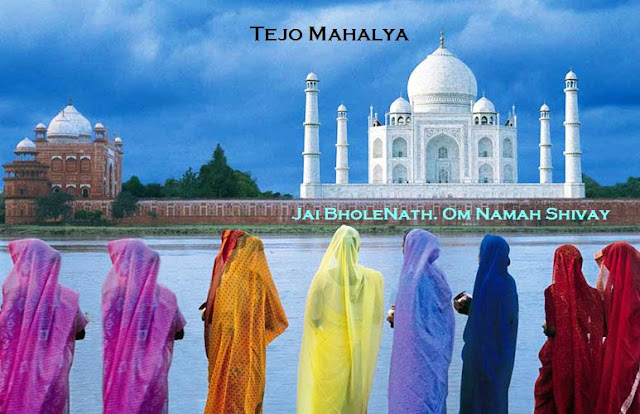
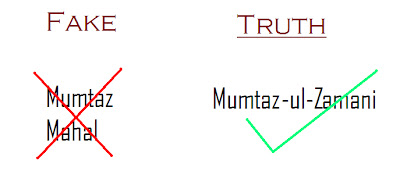





Positive site, where did u come up with the information on this posting? I'm pleased I discovered it though, ill be checking back soon to find out what additional posts you include. small environmental chamber
ReplyDelete